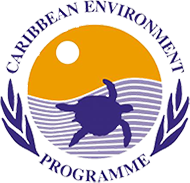Building Partnerships is at the core of our work
During the adoption of the Cartagena Convention in 1983, Governments of the Wider Caribbean Region recognized the importance of cooperation for the protection and sustainable development of the Wider Caribbean Region’s marine and coastal environment. Partnerships are critical for coordinated and integrated responses to shared environmental challenges. Since the entry into force of the Convention, the Secretariat has built on its commitment to establish new partnerships, with national governments, other Regional Seas Programmes, non-governmental organizations and international agencies to strengthen cooperation and ocean governance in the region.
The Secretariat and the CLME+ Strategic Action Programme
One such partnership has been with the United Nations Development Programme/Global Environment Facility-funded project for the Caribbean and North Brazil Shelf Large Marine Ecosystems (CLME+ Project), for which the Secretariat is a partner executing agency. This 5-year project (2016-2021) supports the implementation of a “10-year CLME+ Strategic Action Programme for the Sustainable Management of the shared Living Marine Resources of the Caribbean and North Brazil Shelf Large Marine Ecosystems” (the “CLME+ SAP”), which was one of the key outputs of the first UNDP/GEF CLME Project (2009-2014). The SAP focuses on priority actions that address the root causes of habitat degradation, marine pollution and the unsustainable fishing in the CLME+ region. As of 3rd June 2019, the CLME+ SAP has been politically endorsed by 35 Ministers representing 25 countries and 6 overseas territories in the Wider Caribbean Region.
Through the CLME+ SAP, regional Governments have committed to implement a comprehensive package of coordinated “Strategies” and “Actions”. Six Strategies and four Sub-Strategies were defined under the SAP, covering 76 short-term (0-5 years) and medium-term (6-10 years) priority actions for improving marine resources governance. The Secretariat leads the implementation of Strategy 1 to enhance regional governance arrangements for the protection of the marine environment. This includes establishing and strengthening regional institutional coordination arrangements and enhancing the capacity of regional, sub-regional and national governance procedures for the monitoring, assessment and reporting on the state of the marine environment. The Secretariat will also partner with other agencies on the implementation of Strategy 4 (to enhance the governance arrangements for ecosystem-based management for reefs and associated ecosystems) and Strategy 6 (to implement Ecosystem-Based Management (EBM) and the Ecosystem Approach to Fisheries (EAF) of the Guianas-Brazil continental shelf with special reference to the shrimp and groundfish fishery).
Participation in the CLME+ SAP Interim Coordination Mechanism


In addition to collaborating on the implementation of the abovementioned strategies, the Cartagena Convention Secretariat is also a member of the “Interim Coordination Mechanism for the Sustainable Management, Use and Protection of shared Living Marine Resources in the Caribbean and North Brazil Shelf Large Marine Ecosystems” (known as the “CLME+ SAP ICM). The ICM was formally established in 2017 and responds to action items under the UNDP/GEF CLME+ SAP Strategy 3 (to establish and operationalize a regional policy coordination mechanism for ocean governance, with initial focus on shared Living Marine Resources). The aim of the ICM is to enhance regional coordination and collaboration, promote the up-scale of actions by all sectors of society to achieve the long-term vision of the CLME+ SAP, and support oversight of activities for sustainable fisheries and sustainable use of the marine environment.
During the recent Conference of Contracting Parties to the Cartagena Convention (15th COP) in June 2019, the Secretariat was requested to continue its collaboration with the SAP Interim Coordination Mechanism and conduct the necessary assessments regarding the possibility of hosting a Permanent Coordination Mechanism (PCM). As a follow up to this Decision, the Secretariat participated in discussions with the Project Coordination Unit of the UNDP/GEF CLME+ Project and other stakeholders at the Second Regional Consultation Meeting on the Proposal for a Permanent Coordination Mechanism for Ocean Governance and the Fifth Meeting of the SAP ICM, that were held in Panama City, Panama from 29th July to 2nd August 2019. Also in attendance were representatives from other UN agencies, national governments and regional organizations. The dialogue among participants focused on, among other things, the proposed mandate and structure of the PCM, the roles and responsibilities of countries, inter-governmental organizations and the Secretariat, as well as, recommendations for the proposed hosting and financing of the PCM.
Next Steps for the CLME+ SAP ICM
Discussions on the functioning of the Interim Coordination Mechanism and the establishment of the proposed Permanent Coordination Mechanism will continue from 16th to 20th September in the margins of the 21st Annual Meeting of the Global Community of Practitioners on Large Marine Ecosystems (LME COP21) in Cartagena, Colombia.
ICM Members will review the implementation progress of the SAP, develop the ICM work plan and analyze the achievements to date, as well as, discuss the continuity of the CLME+ initiative and draft a new Project Concept Note.






